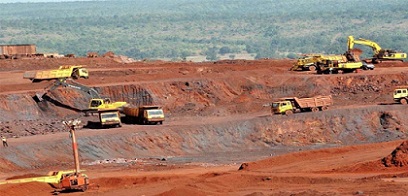By Our Correspondent
NEW DELHI/BHUBANESWAR: With the Naveen Patnaik led Government in Odisha, which had already approached the Union Government to hike the current 30% use of total DMF funds to 60% of the Rs 9000 crore reserved in Odisha DMF Funds and also reportedly eyeing on Rs 17,000 crore deposited at RBI account of Odisha Mineral Bearing Areas Development Corporation (OMBADC) and the Compensatory Afforestation (CAMPA) was on Saturday got a huge shock after Federation of Indian Mineral Industries (FIMI) has sought a slew of measures from the Union Finance Ministry to help the mining industry survive the unprecedented onslaught of a virulent pandemic.
In view of the COVID-19 outbreak and subsequent nationwide lockdown, mining operations have been badly hit. Faced with immense pressure to service existing loans and incur costs towards manpower salaries, miners have asked for deferment of statutory dues like mineral royalties, District Mineral Fund (DMF), National Mineral Exploration Trust (NMET), transfer charges and other levies & cess imposed by the state government till March 2021.
The State Government is likely to withdraw around Rs 12,000 crore from these two accounts at RBI. Sources said, Justice (Retired) AK Patnaik, who heads the oversight committee supervising OMBADC’s expenditures, will take a final call on it.The Rs 17,000 crore fund was born when the Supreme Court on August 2, 2017 levied a compensation charge on miners for violations of environmental laws. The state was directed to spend the funds in districts affected by mining activities. Much of this money lies unspent, as does the huge amount iron ore-rich districts such as Keonjhar earn as tax levied towards district mineral funds.
Earlier, the Centre had allowed states to tap into 30% of unutilised district mineral funds for use in the fight against Covid-19. Odisha may, if required, later also push its cash-rich PSUs to increase expenditure, to help boost economic activity.
In a letter to Union Finance and Corporate Affairs Minister Nirmala Sitharaman, FIMI’s Secretary General RK Sharma said “With moratorium on statutory payment, mining companies and manufacturers of commodities will be able to cope with cost at subdued production level and thereby manufacturing industry will be able to sustain in this tough time in India. Since mining is a labour-intensive industry, it is of paramount importance to ensure the safety of miners and follow the social distancing norms,”.
“Thus, it would be prudent to temporarily reduce some of the financial obligations on the mining companies so as to free up additional funds for the companies to fight the Covid menace, reduce the operational hazards and ensure the safety of miners”, he added. The countrywide lockdown to curb the spread of the viral contagion has critical repercussions on mining and mineral-based industries.
“Eighty to 85 per cent of the trucks are not plying on roads and this has impacted the loading and unloading of materials. Amid fears of the Novel Coronavirus disease, majority of the workforce has already left for their native villages. Building confidence and reengaging them would take at least three to four months to restore normal production levels. Despite being termed essential service, mineral-based industries have scaled down or suspended operations”, said an official with a mining company.
Industry observers believe Q1 would be a complete washout for the mining sector. And, assuming subdued activity during monsoons or Q2 (July-September), revival is only expected towards the second half of FY21.
Setback to mining does not bode well for the country’s economy. Nor does it spell good tidings for resource rich states. Mining generates employment for four million people. Its multiplier effect on industrial production at 1.2-1.4 times can’t be trifled with. Mining contributes two per cent to the national GDP. But in mineral rich states such as Odisha, Jharkhand and Chhattisgarh, its share exceeds 10 per cent to the respective Gross State Domestic Product (GSDP).
More, with domestic demand for iron ore flagging as steel mills take time to revert to full scale production, miners look at exports to offset losses.
Production is yet to take off from merchant mines post online auctions as new leaseholders await grant of official orders. In this phase of limbo, the stockpiled iron ore with a preponderance of baser grade fines has emerged as a vexatious issue for the miners. Though miners are keen to clear this accumulated inventory by exports, the prevailing 30 per cent duty has queered the pitch.
“The country is carrying non-moving stock of more than 162 million tonnes of iron ore majority of which is lying in Odisha and Jharkhand. Such grade of material is not required by the domestic steel industry. Withdrawal of duty will facilitate in monetising the non-moving stock and will be a major contribution of revenue in the current sagging economy”, said Sharma.






























